Kick the bucket
Where does the phrase 'kick the bucket' originate from?

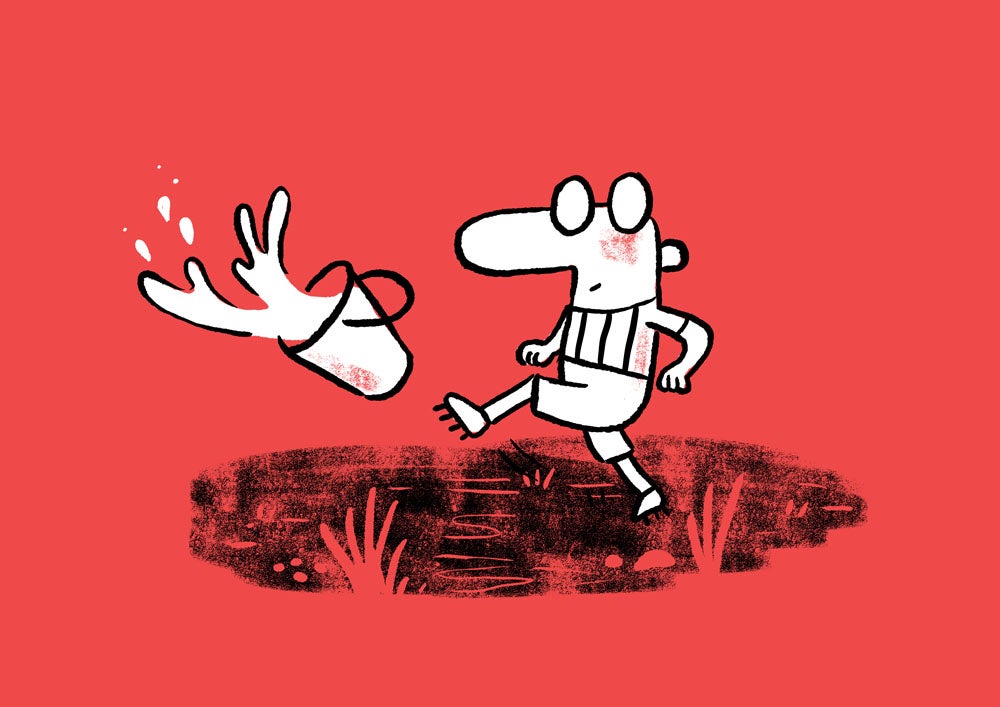
Several theories have been suggested as to the origin of the phrase.
The Oxford English Dictionary favours the origin of the phrase being slaughtered pigs struggling on a beam called a ‘bucket’ while being suspended by their feet. Others view it as a relic of hanging, where a bucket would be kicked out from under feet by the executioner.
Another theory holds that corpses would extend their feet at the point of death and knock over a bucket of holy water placed at their feet as part of a Catholic ritual.
Several theories have been suggested as to the origin of the phrase.
The Oxford English Dictionary favours the origin of the phrase being slaughtered pigs struggling on a beam called a ‘bucket’ while being suspended by their feet. Others view it as a relic of hanging, where a bucket would be kicked out from under feet by the executioner.
Another theory holds that corpses would extend their feet at the point of death and knock over a bucket of holy water placed at their feet as part of a Catholic ritual.
Several theories have been suggested as to the origin of the phrase.
The Oxford English Dictionary favours the origin of the phrase being slaughtered pigs struggling on a beam called a ‘bucket’ while being suspended by their feet. Others view it as a relic of hanging, where a bucket would be kicked out from under feet by the executioner.
Another theory holds that corpses would extend their feet at the point of death and knock over a bucket of holy water placed at their feet as part of a Catholic ritual.
Several theories have been suggested as to the origin of the phrase.
The Oxford English Dictionary favours the origin of the phrase being slaughtered pigs struggling on a beam called a ‘bucket’ while being suspended by their feet. Others view it as a relic of hanging, where a bucket would be kicked out from under feet by the executioner.
Another theory holds that corpses would extend their feet at the point of death and knock over a bucket of holy water placed at their feet as part of a Catholic ritual.
Six feet under
Why do we say 'six feet under'?
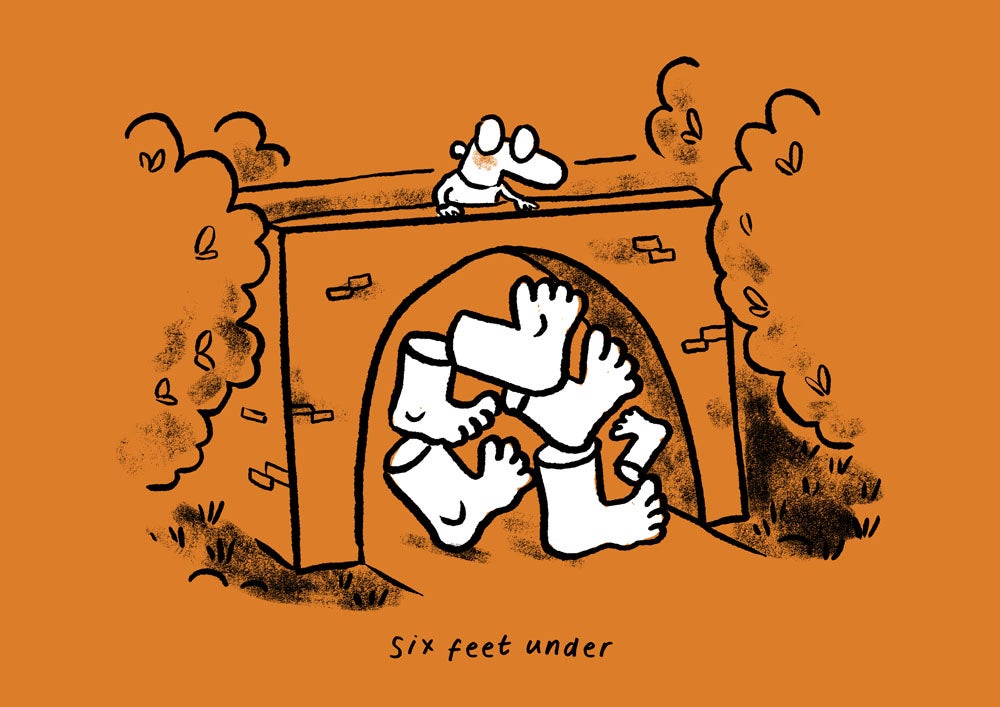

During the Great Plague of London in 1665, Lord Mayor John Lawrence instructed that all graves be dug a minimum distance below ground to prevent the further spread of infection. It’s (thankfully) no longer a requirement, but we still talk about being six feet under to this day.
During the Great Plague of London in 1665, Lord Mayor John Lawrence instructed that all graves be dug a minimum distance below ground to prevent the further spread of infection. It’s (thankfully) no longer a requirement, but we still talk about being six feet under to this day.
During the Great Plague of London in 1665, Lord Mayor John Lawrence instructed that all graves be dug a minimum distance below ground to prevent the further spread of infection. It’s (thankfully) no longer a requirement, but we still talk about being six feet under to this day.
During the Great Plague of London in 1665, Lord Mayor John Lawrence instructed that all graves be dug a minimum distance below ground to prevent the further spread of infection. It’s (thankfully) no longer a requirement, but we still talk about being six feet under to this day.
Sleeping with the fishes
Where does 'sleeping with the fishes' come from?


Although the phrase was popularised by Francis Ford Coppola’s The Godfather, it appears that Luca Brasi wasn’t the first person to meet such a fate.
The expression was alive and well in English at least as far back as the 19th century - and possibly earlier.
The Oxford English Dictionary does have an entry from an 1891 slang dictionary of “feed the fishes” used figuratively to mean “to be drowned.”
Although the phrase was popularised by Francis Ford Coppola’s The Godfather, it appears that Luca Brasi wasn’t the first person to meet such a fate.
The expression was alive and well in English at least as far back as the 19th century - and possibly earlier.
The Oxford English Dictionary does have an entry from an 1891 slang dictionary of “feed the fishes” used figuratively to mean “to be drowned.”
Although the phrase was popularised by Francis Ford Coppola’s The Godfather, it appears that Luca Brasi wasn’t the first person to meet such a fate.
The expression was alive and well in English at least as far back as the 19th century - and possibly earlier.
The Oxford English Dictionary does have an entry from an 1891 slang dictionary of “feed the fishes” used figuratively to mean “to be drowned.”
Although the phrase was popularised by Francis Ford Coppola’s The Godfather, it appears that Luca Brasi wasn’t the first person to meet such a fate.
The expression was alive and well in English at least as far back as the 19th century - and possibly earlier.
The Oxford English Dictionary does have an entry from an 1891 slang dictionary of “feed the fishes” used figuratively to mean “to be drowned.”
Buying the farm
What is the origin of the phrase 'buying the farm'?


Flying accidents by US Air Force trainees in rural areas during World War 2 would often involve the destruction of land or property; government compensation to the owners would then effectively ‘buy the farm’.
Flying accidents by US Air Force trainees in rural areas during World War 2 would often involve the destruction of land or property; government compensation to the owners would then effectively ‘buy the farm’.
Flying accidents by US Air Force trainees in rural areas during World War 2 would often involve the destruction of land or property; government compensation to the owners would then effectively ‘buy the farm’.
Flying accidents by US Air Force trainees in rural areas during World War 2 would often involve the destruction of land or property; government compensation to the owners would then effectively ‘buy the farm’.
The final curtain
Is it clear why we say 'the final curtain'?
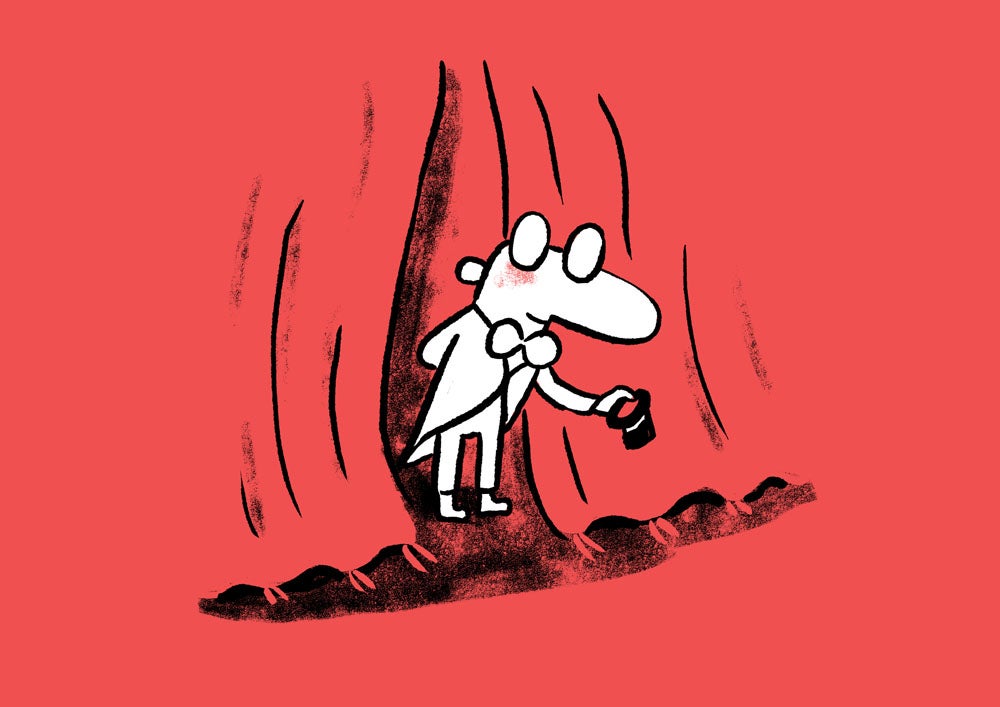
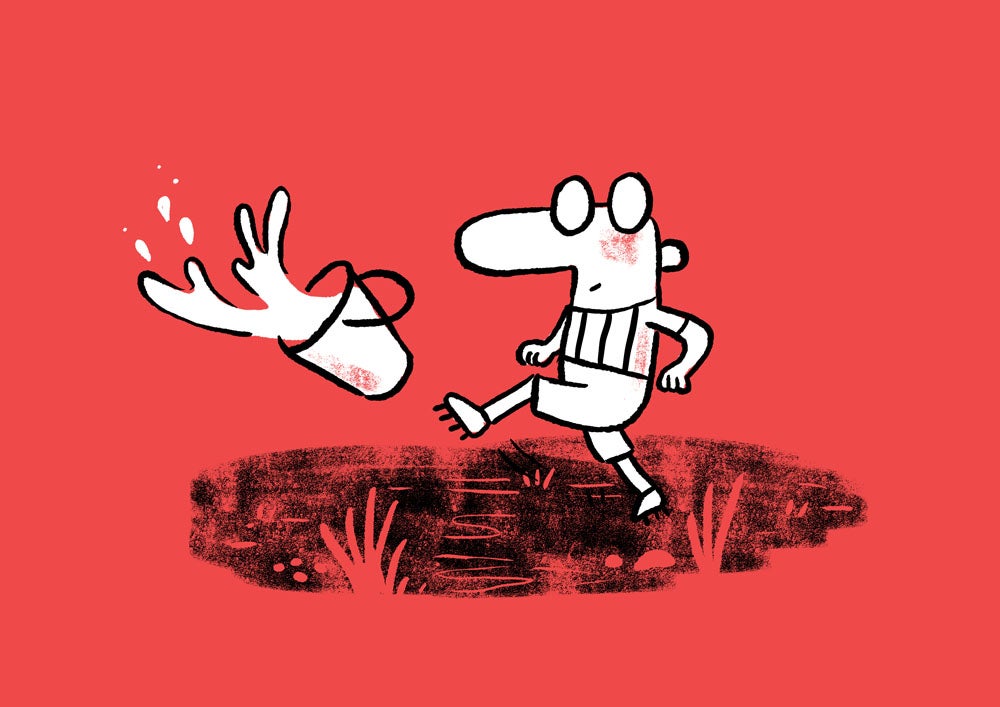
This one’s quite straightforward. The final stage direction in theatre is traditionally 'curtain'.
So, by extension, 'curtains' means the end, death, or other finality.
This one’s quite straightforward. The final stage direction in theatre is traditionally 'curtain'.
So, by extension, 'curtains' means the end, death, or other finality.
This one’s quite straightforward. The final stage direction in theatre is traditionally 'curtain'.
So, by extension, 'curtains' means the end, death, or other finality.
This one’s quite straightforward. The final stage direction in theatre is traditionally 'curtain'.
So, by extension, 'curtains' means the end, death, or other finality.
Pass away
What does 'pass away' really mean?


The verb “pass” passed into English in the early 13th century by way of England’s Norman rulers. The Anglo-Norman verb passer meant, among other things, to pass by, to exceed or surpass, to go beyond, and to depart life, and those were among the earliest meanings of the verb “pass” in English.
The English verb has been used in reference to dying since around the year 1230, according to the Oxford English Dictionary. Many of the early published references cited in the OED use it in the verbal phrases “pass to God” or “pass to heaven.” The verbal phrase “pass away,” which is more common today, dates from the 14th century.
The verb “pass” passed into English in the early 13th century by way of England’s Norman rulers. The Anglo-Norman verb passer meant, among other things, to pass by, to exceed or surpass, to go beyond, and to depart life, and those were among the earliest meanings of the verb “pass” in English.
The English verb has been used in reference to dying since around the year 1230, according to the Oxford English Dictionary. Many of the early published references cited in the OED use it in the verbal phrases “pass to God” or “pass to heaven.” The verbal phrase “pass away,” which is more common today, dates from the 14th century.
The verb “pass” passed into English in the early 13th century by way of England’s Norman rulers. The Anglo-Norman verb passer meant, among other things, to pass by, to exceed or surpass, to go beyond, and to depart life, and those were among the earliest meanings of the verb “pass” in English.
The English verb has been used in reference to dying since around the year 1230, according to the Oxford English Dictionary. Many of the early published references cited in the OED use it in the verbal phrases “pass to God” or “pass to heaven.” The verbal phrase “pass away,” which is more common today, dates from the 14th century.
The verb “pass” passed into English in the early 13th century by way of England’s Norman rulers. The Anglo-Norman verb passer meant, among other things, to pass by, to exceed or surpass, to go beyond, and to depart life, and those were among the earliest meanings of the verb “pass” in English.
The English verb has been used in reference to dying since around the year 1230, according to the Oxford English Dictionary. Many of the early published references cited in the OED use it in the verbal phrases “pass to God” or “pass to heaven.” The verbal phrase “pass away,” which is more common today, dates from the 14th century.
Shuffling off this mortal coil
What is a 'mortal coil' and why do we 'shuffle' it off?


It plays a central part in Hamlet’s famous ‘to be or not to be’ soliloquy, along with such famous phrases as “ay, there’s the rub” and "to sleep, perchance to dream”. In Shakespeare's time 'coil', or coile', or coyle', meant 'fuss' or 'bustle', so it’s thought that dying could be viewed as a way of casting off the trouble and strife of daily life. However, it’s uncertain that, as a euphemism for dying, it was coined by the Bard.
So we don't really know.
It plays a central part in Hamlet’s famous ‘to be or not to be’ soliloquy, along with such famous phrases as “ay, there’s the rub” and "to sleep, perchance to dream”. In Shakespeare's time 'coil', or coile', or coyle', meant 'fuss' or 'bustle', so it’s thought that dying could be viewed as a way of casting off the trouble and strife of daily life. However, it’s uncertain that, as a euphemism for dying, it was coined by the Bard.
So we don't really know, but this may well be right.
It plays a central part in Hamlet’s famous ‘to be or not to be’ soliloquy, along with such famous phrases as “ay, there’s the rub” and "to sleep, perchance to dream”. In Shakespeare's time 'coil', or coile', or coyle', meant 'fuss' or 'bustle', so it’s thought that dying could be viewed as a way of casting off the trouble and strife of daily life. However, it’s uncertain that, as a euphemism for dying, it was coined by the Bard.
So we don't really know.
It plays a central part in Hamlet’s famous ‘to be or not to be’ soliloquy, along with such famous phrases as “ay, there’s the rub” and "to sleep, perchance to dream”. In Shakespeare's time 'coil', or coile', or coyle', meant 'fuss' or 'bustle', so it’s thought that dying could be viewed as a way of casting off the trouble and strife of daily life. However, it’s uncertain that, as a euphemism for dying, it was coined by the Bard.
So we don't really know.
Going west
Where did we get 'going west' from?


This is a lesser-known euphemism, with an uncertain origin.
It is viewed in some quarters as a connection with with the direction of the setting sun, and the end of the day.
Other theories suggest that it refers to the ride that condemned prisoners in London took along Holborn from Newgate Prison to Marble Arch.
This is a lesser-known euphemism, with an uncertain origin.
It is viewed in some quarters as a connection with with the direction of the setting sun, and the end of the day.
Other theories suggest that it refers to the ride that condemned prisoners in London took along Holborn from Newgate Prison to Marble Arch.
This is a lesser-known euphemism, with an uncertain origin.
It is viewed in some quarters as a connection with with the direction of the setting sun, and the end of the day.
Other theories suggest that it refers to the ride that condemned prisoners in London took along Holborn from Newgate Prison to Marble Arch.
This is a lesser-known euphemism, with an uncertain origin.
It is viewed in some quarters as a connection with with the direction of the setting sun, and the end of the day.
Other theories suggest that it refers to the ride that condemned prisoners in London took along Holborn from Newgate Prison to Marble Arch.
Pushing up daisies
Where does the phrase 'pushing up the daisies' come from?

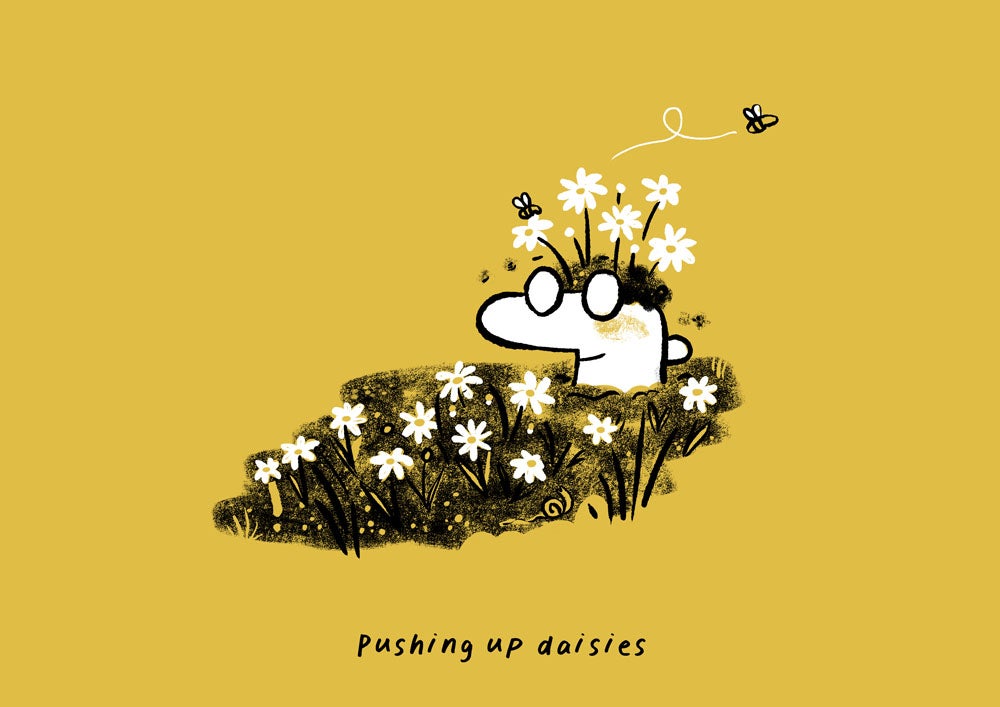
According to the OED, ‘pushing up daisies’ as an exact phrase was first recorded in English in ‘A Terre’ - a Wilfred Owen poems about World War 1, referring to the flowers which might grow over a grave.
However, Victor Hugo also used the phrase ‘manger les pissenlits par la racine’ (eat the dandelions by the root) in the same context in Les Misérables, and daisies have been linked with death as far back as Celtic lore.
According to the OED, ‘pushing up daisies’ as an exact phrase was first recorded in English in ‘A Terre’ - a Wilfred Owen poems about World War 1, referring to the flowers which might grow over a grave.
However, Victor Hugo also used the phrase ‘manger les pissenlits par la racine’ (eat the dandelions by the root) in the same context in Les Misérables, and daisies have been linked with death as far back as Celtic lore.
According to the OED, ‘pushing up daisies’ as an exact phrase was first recorded in English in ‘A Terre’ - a Wilfred Owen poems about World War 1, referring to the flowers which might grow over a grave.
However, Victor Hugo also used the phrase ‘manger les pissenlits par la racine’ (eat the dandelions by the root) in the same context in Les Misérables, and daisies have been linked with death as far back as Celtic lore.
According to the OED, ‘pushing up daisies’ as an exact phrase was first recorded in English in ‘A Terre’ - a Wilfred Owen poems about World War 1, referring to the flowers which might grow over a grave.
However, Victor Hugo also used the phrase ‘manger les pissenlits par la racine’ (eat the dandelions by the root) in the same context in Les Misérables, and daisies have been linked with death as far back as Celtic lore.
To croak
Why do we say a person 'croaked'?


According to the Oxford English Dictionary, the term “croak” entered English in the second half of the 16th century. However it wasn’t until the 19th century that the verb took on the slang sense of dying.
Here’s a citation from an 1873 slang dictionary: “Croak, to die—from the gurgling sound a person makes when the breath of life is departing.”
According to the Oxford English Dictionary, the term “croak” entered English in the second half of the 16th century. However it wasn’t until the 19th century that the verb took on the slang sense of dying.
Here’s a citation from an 1873 slang dictionary: “Croak, to die—from the gurgling sound a person makes when the breath of life is departing.”
According to the Oxford English Dictionary, the term “croak” entered English in the second half of the 16th century. However it wasn’t until the 19th century that the verb took on the slang sense of dying.
Here’s a citation from an 1873 slang dictionary: “Croak, to die—from the gurgling sound a person makes when the breath of life is departing.”
According to the Oxford English Dictionary, the term “croak” entered English in the second half of the 16th century. However it wasn’t until the 19th century that the verb took on the slang sense of dying.
Here’s a citation from an 1873 slang dictionary: “Croak, to die—from the gurgling sound a person makes when the breath of life is departing.”
You scored [quiz-number-correct] out of a possible [quiz-number-total]
10 Sesquipedalian – you’re an etymology expert
7-9 Articulate - you know your language well
4-6 Fluent – you have a good grasp of phrases and sayings
1-3 Literate – not bad, but some extra reading is required
0 How about another go? Click here to take the quiz again
If you want to move beyond clichés and fancy having a more meaningful discussion about bereavement and end-of-life planning, we have a range of free guides and information resources for older people and their families that can help. Visit our webpage about end of life.
If you're interested in other euphemisms for death and their history read the 8 weirdest ways to say 'died'.